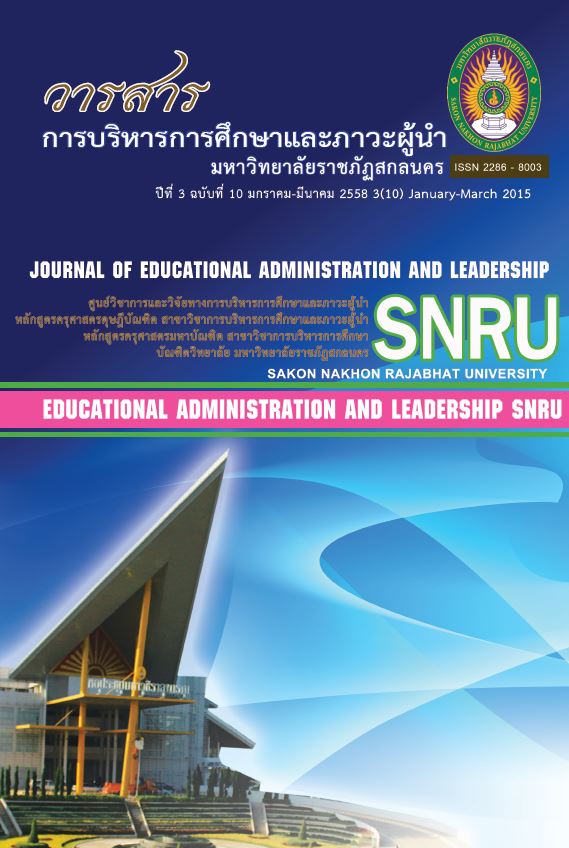

การพัฒนานักเรียนตามหลักของปรัชญาเศรษฐกิจพอเพียง โรงเรียนสหราษฎร์รังสฤษดิ์ สังกัดสำนักงานเขตพื้นที่การศึกษามัธยมศึกษา เขต 22
Students’ Development Based on Sufficiency Economy Philosophy Principles at Saharajrungsarid School under the Office of Secondary Educational Service Area 22
ผู้แต่ง
สมหญิง ใหญ่พงศกร, เพลินพิศ ธรรมรัตน์, ธวัชชัย ไพใหล
บทคัดย่อ
บทคัดย่อ
การวิจัยครั้งนี้ใช้กระบวนการวิจัยเชิงปฏิบัติการแบบมีส่วนร่วม (Participatory Action Research : PAR) เพื่อพัฒนานักเรียนตามหลักของปรัชญาเศรษฐกิจพอเพียง โรงเรียนสหราษฎร์รังสฤษดิ์ สังกัดสำนักงานเขตพื้นที่การศึกษามัธยมศึกษา เขต 22 โดยมีความมุ่งหมาย ดังนี้ 1) ศึกษาสภาพ และปัญหาการจัดกิจกรรมตามหลักของปรัชญาเศรษฐกิจพอเพียง 2) หาแนวทางพัฒนานักเรียนตามหลักของปรัชญาเศรษฐกิจพอเพียง และ 3) ผลการพัฒนานักเรียนตามหลักของปรัชญาเศรษฐกิจพอเพียง กลุ่มเป้าหมาย คือ นักเรียนระดับชั้นมัธยมศึกษาปีที่ 1-6 จำนวน 1,200 คน เครื่องมือที่ใช้ในการเก็บรวบรวมข้อมูล ได้แก่ แบบสัมภาษณ์ แบบสอบถาม แบบบันทึกการประชุม แบบสังเกต และแบบประเมินความพึงพอใจ สำหรับการวิเคราะห์ข้อมูลเชิงปริมาณใช้สถิติร้อยละ ค่าเฉลี่ย และค่าส่วนเบี่ยงเบนมาตรฐาน และการตรวจสอบข้อมูลเชิงคุณภาพ
ผลการวิจัย พบว่า
1. สภาพและปัญหาการจัดกิจกรรมตามหลักของปรัชญาเศรษฐกิจพอเพียง โรงเรียนสหราษฎร์รังสฤษดิ์ สังกัดสำนักงานเขตพื้นที่การศึกษามัธยมศึกษา เขต 22 สรุปผลการศึกษาได้ดังนี้
1.1 สภาพการการจัดกิจกรรมตามหลักของปรัชญาเศรษฐกิจพอเพียง พบว่า นักเรียนมีค่านิยมไม่พึงประสงค์ เช่น นักเรียนไม่ค่อยตั้งใจเรียน ไม่ชอบอ่านหนังสือ ไม่ชอบการจดบันทึก นักเรียนใช้จ่ายเงินฟุ่มเฟือย ทั้งด้านอุปโภคและบริโภค ขาดการออมเงิน ขาดความรู้เท่าทันเทคโนโลยี ตกเป็นทาสของวัตถุนิยมมากเกินไป โรงเรียนจัดกิจกรรมให้นักเรียนมีความรู้ .เป็นคนเก่ง คนดี มีความสุขและเพื่อปลูกฝังคุณธรรม ความสำนึกในการเป็นชาติไทย และวิถีชีวิตตามหลักปรัชญาเศรษฐกิจพอเพียง
1.2 ปัญหาก่อนดำเนินการจัดกิจกรรมตามหลักของปรัชญาเศรษฐกิจพอเพียง พบว่า ด้านครู 1) กิจกรรมส่งเสริมหลักปรัชญาเศรษฐกิจพอเพียง ไม่ชัดเจน มีน้อย 2) ระบบการบริหารจัดการไม่ดีพอ 3) ครูไม่เข้าใจบทบาทหน้าที่รับผิดชอบในการจัดกิจกรรม 4) ขาดความร่วมมือในการจัดกิจกรรมของครูในแต่ละกลุ่มสาระการเรียนรู้ ด้านนักเรียน 1) นักเรียนขาดความรู้ความเข้าใจในหลักปรัชญาเศรษฐกิจพอเพียง 2) นักเรียนไม่เข้าร่วมกิจกรรมส่งเสริมปรัชญาเศรษฐกิจพอเพียง
2. แนวการพัฒนานักเรียนตามหลักของปรัชญาเศรษฐกิจพอเพียง โดยใช้การจัดกิจกรรม 9 กิจกรรม ได้แก่ 1) กิจกรรมต้นกล้าคุณธรรม 2) กิจกรรมตักบาตรทุกวันศุกร์ 3) กิจกรรมสมาธิดี ห้านาทีก่อนเข้าเรียน 4) กิจกรรมสมุดบันทึกความดี 5) กิจกรรมพักทุกงาน อ่านทุกอย่าง 6) กิจกรรมคนเก่งวิชาการ 7) กิจกรรมสมุดบันทึกรายรับ-รายจ่าย 8) กิจกรรมประกวดเขตพื้นที่รับผิดชอบ 9) กิจกรรมพืชผักสวนครัว รั้วกินได้
3. ผลการพัฒนานักเรียนตามหลักของปรัชญาเศรษฐกิจพอเพียง พบว่า 1) กิจกรรมต้นกล้าคุณธรรม นักเรียนได้รับความรู้ความเข้าใจและวิธีนำคุณธรรมมาปฏิบัติในชีวิตประจำวัน นักเรียนเข้าค่ายต้นกล้าคุณธรรม 3 วัน 2 คืน 2) กิจกรรมตักบาตรทุกวันศุกร์ นักเรียนทำบุญตักบาตรถูกต้องตามขั้นตอน และตักบาตรทุกวันศุกร์ อย่างน้อย 8 ครั้ง 3) กิจกรรมสมาธิดี ห้านาทีก่อนเรียน นักเรียนได้รับความรู้ความเข้าใจ วิธีการทำสมาธิ นักเรียนนั่งสมาธิ 5 นาที ก่อนเริ่มเรียนหนังสือ 4) กิจกรรมสมุดบันทึกความดี นักเรียนทำความดีแล้วบันทึกลงในสมุดความอย่างน้อยวันละ 1 ครั้ง 5) กิจกรรมพักทุกงาน อ่านทุกอย่าง นักเรียนได้รับความรู้ความเข้าใจ วิธีการอ่านหนังสือ นักเรียนอ่านหนังสืออย่างน้อยวันละ 1 เรื่อง แล้วจดบันทึกสาระสำคัญก่อนเรียนวิชาแรกของทุกวัน 6) กิจกรรมคนเก่งวิชาการ นักเรียนขยันตั้งใจเรียน มีผลการเรียนดี ผ่านตามเกณฑ์ 7) กิจกรรมสมุดบันทึกรายรับ-รายจ่าย นักเรียนได้รับความรู้ความเข้าใจและวิธีการทำบัญชีรายรับ รายจ่าย นักเรียนบันทึกรายรับ รายจ่าย ใช้จ่ายอย่างประหยัด และมีเงินออมฝากธนาคารโรงเรียน 8) กิจกรรมประกวดเขตพื้นที่รับผิดชอบ นักเรียนรักษาความสะอาดเขตพื้นที่รับผิดชอบ สะอาด ไม่มีขยะ 9) กิจกรรมพืชผักสวนครัว รั้วกินได้ นักเรียนได้รับความรู้และความเข้าใจวิธีการปลูกผักสวนครัว นักเรียนสามารถปลูกพืชผักสวนครัว
Abstract
ABSTRACT
The objectives of this participatory action research aimed to 1) examine conditions and problems of school activity management based on principles of sufficiency economy philosophy at Saharajrungsarid School under the Office of Secondary Educational Service Area 22, 2) establish the guidelines for developing students based on principles of sufficiency economy philosophy, and 3) follow up the effects after the intervention. The target groups were 1,200 students from Mathayomsuksa 1-6. The research instruments were an interview from, a questionnaire form, minutes of meetings, an observation form, a satisfaction assessment form. The statistics were percentage, mean, and standard deviation. The quality approach was also employed to verify the collected data.
The findings were as follows:
1. The present state and problem of Students’ Development Based on Sufficiency Economy Philosophy Principles at Saharajrungsarid School under the office of Secondary Education Service Area 22, The results of this research showed as following:
1.1 The present state Students’ Development Based on Sufficiency Economy Philosophy Principles revealed students have value which should not admire such as don't intend to learn, poor reading habits, being unprepared for class/not taking notes, extravagance, not saving, limited technology skill and materialism.
1.2 The problem before use Students’ Development Based on Sufficiency Economy Philosophy Principles revealed: The teacher 1) the school activities implemented were inadequate and unclear. 2) lack of good management 3) the teacher did not understand about individual roles and responsibility. 4) lack of teacher’s participation. The student 1) they lacked knowledge and understanding about principles of sufficiency economy philosophy 2) they did not participate in principles of sufficiency economy philosophy activities.
2. The guidelines for developing students based on principles of sufficiency economy philosophy involved nine activities as follows: 1) “Saplings of Moral Growth” program (Moral Growth Development for Youngers), 2) Making Merit on Friday, 3) a Five-minute Meditation, 4) Moral Diary, 5) “Reading Everything You Can in Your Spare Time” program, 6) Smart Student, 7) “Individual Accounting Records” program, 8) Competition on Individual Responsibility for Cleaning Up Assigned Areas, and 9) “Edible Vegetable Garden Fence” program.
3. The effects after the intervention revealed that: 1) In terms of “Saplings of Moral Growth” program, the participating students gained knowledge and understanding and were able to apply moral practice in daily life. 2) In terms of Making Merit on Fridays, the participating students gained knowledge and understanding about making merits. In addition, they practiced making merits (offered the food to the monks) on Fridays at least eight times. 3) In terms of a Five-minute Meditation, the participating students demonstrated their knowledge and understanding by meditating for five minutes before starting the class. 4) In terms of Moral Diary (MD), the participating students committed one good deed a day and recorded in their MD, 5) In terms of “Reading Everything You Can in Your Spare Time” program, the participating students obtained knowledge and understanding about reading approaches. The students were also encouraged to read a book a day and to take notes before starting the first class of the day. 6) In terms of “The High Achieving Student” program, the participating students learnt how to apply knowledge and understandings about learning methods. As a result the students were attentive and reached the school criteria level of achievement. 7) In term of “individual Accounting Records” program, the participating students had learnt how to write an accounting record on their expenses. The students participated in a school saving money bank, 8) In term of “Competition on Individual Responsibility for Cleaning Up Assigned Areas” program, the students demonstrated their knowledge and understanding by taking full responsibilities to clean up their assigned areas. Therefore, there was no litter. 9) In term of “Edible Vegetable Garden Fence” program, the students were able to grow edible organic vegetables.
คำสำคัญ
การพัฒนานักเรียน, หลักของปรัชญาเศรษฐกิจพอเพียงKeyword
Student Development, Principles of Sufficiency Economy PhilosophyNotice: Undefined variable: dataSet in /var/www/html/ArticleView.php on line 116
Notice: Trying to access array offset on value of type null in /var/www/html/ArticleView.php on line 116
บทความทุกบทความเป็นลิขสิทธิ์ของ
Notice: Undefined variable: dataSet in /var/www/html/ArticleView.php on line 116
Notice: Trying to access array offset on value of type null in /var/www/html/ArticleView.php on line 116
เท่านั้น
กำลังออนไลน์: 43
วันนี้: 5,106
เมื่อวานนี้: 2,282
จำนวนครั้งการเข้าชม: 1,264,709
อาคารบัณฑิตวิทยาลัย ชั้น 2 ตำบลธาตุเชิงชุม อำเภอเมือง จังหวัดสกลนคร 47000
โทร/
แฟกซ์ 0-4297-0093
บรรณาธิการ: รองศาสตราจารย์ ดร.ไชยา ภาวะบุตร
ติดต่อ/สอบถาม: นายธีรเวทย์ เพียรธัญญกรณ์
โทร: 0-4297-0093